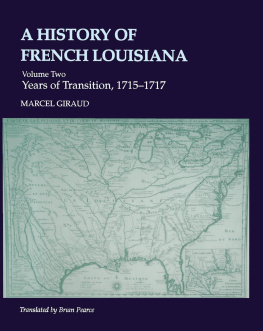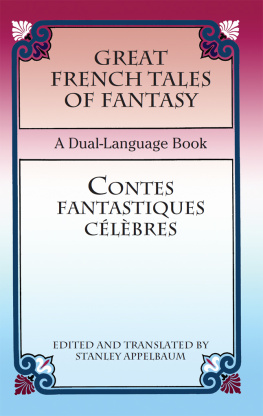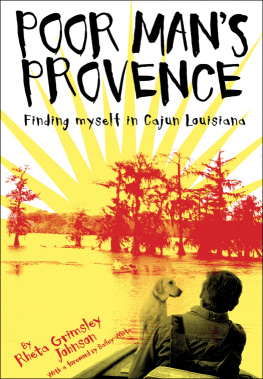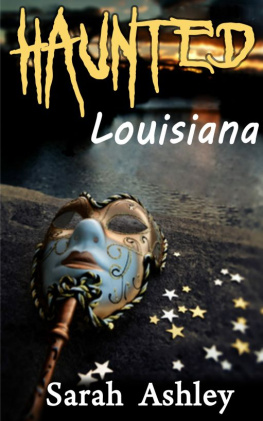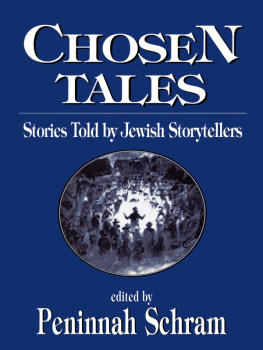Copyright 1994 Barry Jean Ancelet
All Rights Reserved
Manufactured in the United States of America
First published in hardcover in 1994 by Garland Publishing, Inc., as Volume 1 of the World Folktale Library
The paper in this book meets the guidelines for permanence and durability of the Committee on Production Guidelines for Book Longevity of the Council on Library Resources.
Library of Congress Cataloging-in-Publication Data
Cajun and Creole folktales: The French oral tradition of South Louisiana / collected and annotated by Barry Jean Ancelet.
p. cm.
Originally published: New York: Garland, 1994, in series: World Folktale library; v. 1. Includes bibliographical references and index.
ISBN 0878057099 (alk paper)
1. CajunsFolklore. 2. TalesLouisiana. 3. FolkloreLouisiana. 4. Cajun French dialect Texts. I. Ancelet, Barry Jean.
| GR111.F73C35 1994 | 9348885 |
| 398'.089410783dc20 | CIP |
For my grandmothers, Elia Arceneaux Ancelet and Ida Chautin Mayer, and my parents, Maude and Elmo Ancelet
______________________________
Si cest beau, a a pas besoin dtre vrai; et si cest vrai, a a pas besoin dtre beau.
Jean Arceneaux
Foreword
Barry Jean Ancelet is best known among folklorists as the foremost interpreter of Cajun musical traditions. His book, The Makers of Cajun Music (1984), is both a perceptive analysis of Cajun musical styles and a vehicle for the musicians to express, in their own words and on their own terms, their life experiences with and deepest feelings about their art. In this book, as in all his other work, Barry does not steal the stage, but yields it to the performers.
As a scholar, Ancelet takes pride in his folkloric studies. But as a Cajun, he takes equal or greater pride in his role as a leading figure in the Cajun musical renaissance which has deeply affected musicians and music lovers throughout South Louisiana as well as far beyond the borders of the state. In 1974, he co-founded the Tribute to Cajun Music, which has evolved into a two-day self-celebration of Cajun culture that Ancelet directs each September. He also helped originate and now serves as master of ceremonies for the Rendez-Vous des Acadiens, a weekly live broadcast of Cajun music narrated in French. He played an instrumental part in having musicians Dennis McGee, Canray Fontenot, and Dewey Balfa named Honorary Professors of Cajun Music at the University of Southwestern Louisiana. All too often, folklorists have assembled stables of great performers whom theyve exploited and treated in condescending fashion. Ancelets approach has been the opposite: it has been his goal to gain recognition for the artists rather than for himself and to see that they were recognized by their fellow Cajuns, and even by the academy, as the true heroes of the Cajun cultural revival.
Cajun and Creole Folktales reveals another important facet of Ancelets engagement with Louisiana French folklore. When he first introduced me to his work with Cajun narrative he told me, Most people dont know it, but I love the stories as much as the music. I suspect that his regard for these tales runs even deeper than his love of the music, becausewhile the Cajun musical revival is now running on its own steam, carrying with it even the younger Cajuns who know little or no Frenchthe complex tale telling tradition, far more intimate and language-bound, persists hidden from those who are not fluent in French. For most of the last twenty years, Ancelet has worked nearly alone in recording Louisiana French oral narrative and in gaining recognition for the great narrators who have fashioned it.
Since he began collecting folktales in 1973, Ancelet has published numerous tales with commentary in journals and books (1974, 1975, 1980a, 1981, 1982, 1991); conducted specific studies of Cajun anti-clerical humor (1985), oral historical accounts (1983), jokes about Cajuns (1989), and violence in Cajun and Creole folk narrative (1988); and produced a brilliant contextual analysis of a Cajun tall tale telling community (1980b). But the present collection is by far his most comprehensive work; indeed, it is easily the most thorough compendium of Cajun and Creole oral traditions yet published.
Perhaps the most important aspect of Cajun and Creole Folktales is its refusal to submit to the arbitrary restrictions of traditional scholarly boundaries. Ancelet effectively demolishes some of the compartmentalizing stereotypes which dominated early research. First, previous treatments of Louisiana French folktales have dealt exclusively either with black Creoles (e.g., Fortier 1895) or white Cajuns (Saucier 1962). Ancelet, however, treats the two groups as a continuum, an approach which he fully justifies by documenting powerful connections between Cajun and Creole tales. Second, earlier collections were limited in generic breadth: Fortier dealt almost exclusively with animal tales, Saucier, with magic tales; Bergeron (1980), with personal narrativeseach conveyed at best a fragmentary impression of French Louisiana oral art. But Cajun and Creole Folktales presents all of these folk forms, and many more as well, in an expressive span ranging from somber, often-repeated belief legends to fanciful, extemporaneously composed adventures featuring the imaginary tall tale hero Pascal. Finally, earlier collections of Cajun folktalesCalvin Claudel (1948) and Saucierconcentrated on Old World survivals and only included those tales that most strongly reflected the vestiges of seventeenth-century French tradition still alive in Louisiana. Ancelets work presents a much fuller and more accurate account of Cajun taletelling, because he has collected the full repertoire of narrative genres developed by French speakers in the region. As the tales themselves demonstrate, and as Ancelet documents in his copious comparative notes, Cajun and Creole oral traditions are not simply French, but rather unique to French Louisiana, where African, African American, British American, Native American, and Spanish American populations have created a complex cultural mix, and where the once-dominant French-speaking cultures have created artful narrative combinations conditioned by a unique environment and reshaped to meet the distinctive needs and values of the new societies that came into being on the southern Louisiana prairies and bayous.
To transcend the scholarly stereotype that these Louisiana folktales were simply survivals of French originals, Ancelet immersed himself in comparative narrative scholarship, examining parallels from the African, African American, British American, French, French American, French Canadian, Native American, and Spanish American traditions whose mingled presence is reflected in the Cajun and Creole corpus. More importantly, he drew upon his personal experience as a Cajun, a lover of oral historical traditions, and a fluent speaker of Cajun French: only such knowledge could make this collection possible. Most of the narrators whose tales appear here would not have told their tales so richly without the presence of a listener who shared their frame of reference as deeply as did Ancelet. In telling La jument verte, master narrator Flix Richard adorns his tales with subtle cultural cues. For example, the giant hairy-chested bully who confronts the little bachelor has a handkerchief protruding from one of his pocketsa detail that seems absurdly delicate, completely out of place for those who dont know that such handkerchiefs were used in knife fights in Cajun dancehalls. Each fighter would hold one end of the handkerchief in one hand and his knife in the other; this ensured that the two would fight at close quarters. Without a listener who shared his knowledge of Cajun tradition, Flix Richard would not have bothered to add this detail to his taleif he had bothered to tell the tale at all.


